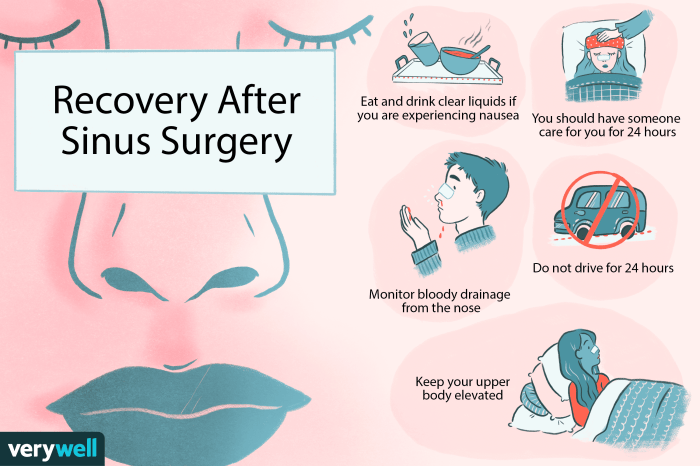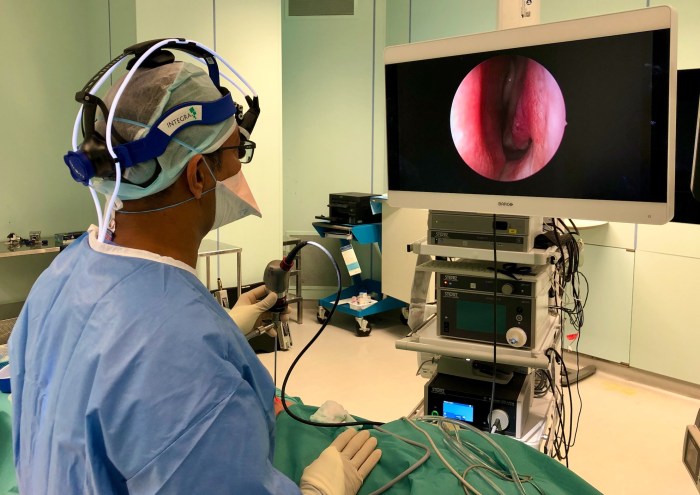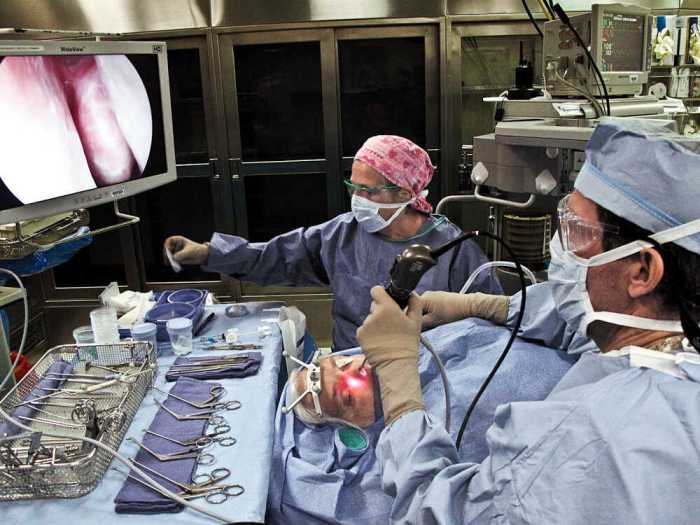Embark on our interactive do I need sinus surgery quiz and uncover the answers you seek. This quiz will guide you through a series of questions, providing valuable insights into your sinus health and whether surgery may be the right path for you.
Delving deeper into the topic, we’ll explore the common symptoms, underlying conditions, and evaluation processes associated with sinus problems. We’ll also shed light on the different surgical procedures available, their advantages and disadvantages, and the potential outcomes and recovery time involved.
Introduction
Sinus surgery is a surgical procedure that can be used to treat a variety of sinus problems, such as chronic sinusitis, nasal polyps, and deviated septum. This quiz is designed to help you determine if you may be a candidate for sinus surgery.
Sinus surgery can be a very effective way to relieve the symptoms of sinus problems. However, it is important to understand that sinus surgery is not a cure-all. It is important to have realistic expectations about the results of sinus surgery.
Sinus surgery can improve your quality of life, but it is not likely to completely eliminate all of your sinus problems.
Benefits of Sinus Surgery
There are a number of potential benefits to sinus surgery, including:
- Relief from sinus pain and pressure
- Improved breathing
- Reduced nasal congestion
- Improved sense of smell and taste
- Reduced risk of sinus infections
Symptoms and Conditions

Persistent sinus issues can manifest in a range of symptoms, signaling the potential need for sinus surgery. These symptoms often stem from underlying conditions that obstruct or irritate the sinuses, leading to discomfort and impaired function.
Common Symptoms
- Persistent facial pain or pressure
- Nasal congestion or difficulty breathing through the nose
- Thick, discolored nasal discharge
- Post-nasal drip
- Reduced sense of smell or taste
Underlying Conditions
Various conditions can contribute to sinus problems, making sinus surgery a viable option when conservative treatments prove ineffective. These conditions include:
- Allergies:Allergic reactions can cause inflammation and swelling in the nasal passages and sinuses, leading to congestion and discomfort.
- Infections:Bacterial or viral infections can cause sinus inflammation and infection, resulting in pain, pressure, and discharge.
- Structural abnormalities:Deviations in the nasal septum or the presence of nasal polyps can obstruct sinus drainage and contribute to sinus problems.
Evaluation and Diagnosis

To evaluate sinus problems, healthcare professionals conduct physical examinations, imaging tests, and endoscopies. During a physical examination, they assess the patient’s nasal passages, sinuses, and surrounding areas for any abnormalities, such as swelling, tenderness, or discharge.
Imaging tests, such as X-rays, computed tomography (CT) scans, and magnetic resonance imaging (MRI), provide detailed images of the sinuses to identify structural abnormalities, blockages, or infections. These tests help determine the extent and location of the sinus problem.
Endoscopies, Do i need sinus surgery quiz
Endoscopies involve inserting a thin, flexible tube with a camera attached into the nasal passages and sinuses. This allows healthcare professionals to visualize the inside of the sinuses directly and assess the presence of inflammation, polyps, or other abnormalities. The findings from these evaluations help determine if sinus surgery is necessary.
Surgical Procedures

Sinus surgery is a surgical procedure to treat chronic sinusitis that has not responded to other treatments. There are several different types of sinus surgery, including endoscopic sinus surgery (ESS) and balloon sinuplasty.
Endoscopic sinus surgery (ESS)is a minimally invasive procedure that uses a small camera and surgical instruments to remove blockages and open up the sinuses. ESS is typically performed on an outpatient basis, and most patients can go home the same day.
If you’re wondering if you need sinus surgery, take our quick quiz to find out. And if you’re looking for more information on sinus surgery, check out our brittany long vsim post quiz . It’s packed with helpful tips and advice from our experts.
Balloon sinuplastyis a newer, less invasive procedure that uses a small balloon to open up the sinuses. Balloon sinuplasty is also typically performed on an outpatient basis, and most patients can go home the same day.
Advantages and Disadvantages
The advantages of ESS and balloon sinuplasty include:
- They are both minimally invasive procedures.
- They are both typically performed on an outpatient basis.
- They both have a high success rate.
The disadvantages of ESS and balloon sinuplasty include:
- They can both cause some discomfort during and after the procedure.
- They can both have some side effects, such as bleeding, swelling, and infection.
- They are not always successful.
Recovery and Outcomes

Following sinus surgery, the recovery time can vary depending on the extent of the procedure and individual factors. Typically, it takes a few weeks to fully recover.
During the recovery period, it is common to experience some discomfort, including pain, swelling, and nasal congestion. These symptoms can usually be managed with over-the-counter pain relievers and decongestants. It is important to follow the doctor’s instructions carefully regarding rest, activity, and medications.
Potential Outcomes
Sinus surgery can effectively improve sinus symptoms and restore nasal function. In most cases, the results are long-lasting, providing significant relief from chronic sinusitis.
Complications
As with any surgical procedure, there are potential risks and complications associated with sinus surgery. These include:
- Bleeding
- Infection
- Damage to surrounding structures, such as the eyes or nerves
- Scarring
- Recurrence of sinus problems
The risk of complications is generally low, and the benefits of sinus surgery often outweigh the potential risks.
Alternative Treatments
Alternative treatments for sinus problems can provide relief without the need for surgery. These options include:
- Medications:Nasal sprays and oral medications can reduce inflammation and congestion. Corticosteroids, antihistamines, and decongestants are commonly used.
- Nasal irrigation:Flushing the nasal passages with saline solution can remove mucus, allergens, and irritants. It can be done using a neti pot, squeeze bottle, or nasal irrigator.
- Lifestyle modifications:Avoiding triggers like allergens, smoke, and pollutants can help reduce sinus problems. Humidifying the air, using a nasal dilator, and getting regular exercise can also be beneficial.
Alternative treatments are often effective for mild to moderate sinus problems. However, if symptoms persist or worsen despite these measures, surgery may be necessary to improve drainage and reduce inflammation.
Decision-Making

Making the decision to undergo sinus surgery requires careful consideration of several factors. It’s crucial to understand the severity of your symptoms, the potential risks and benefits of surgery, and the expected outcomes.
Factors to Consider
- Symptom severity:Determine the impact of sinus symptoms on your daily life, including pain, nasal congestion, facial pressure, and loss of smell.
- Medical history:Discuss your overall health, any underlying conditions, and previous treatments for sinus problems.
- Imaging results:Review the findings of imaging tests, such as CT scans or MRIs, to assess the extent and location of sinus inflammation or blockages.
- Risks and benefits:Weigh the potential risks of surgery, including bleeding, infection, and damage to surrounding structures, against the expected benefits, such as improved breathing and reduced pain.
- Expected outcomes:Discuss with your doctor the likely outcomes of surgery, including the probability of symptom improvement and the potential for recurrence.
FAQ Explained: Do I Need Sinus Surgery Quiz
What are the common symptoms of sinus problems?
Nasal congestion, facial pain and pressure, headaches, reduced sense of smell or taste, post-nasal drip, and fever.
What are the underlying conditions that can contribute to sinus problems?
Allergies, infections, nasal polyps, deviated septum, and structural abnormalities.
How is sinus surgery performed?
Endoscopic sinus surgery (ESS) is a minimally invasive procedure that uses a small camera and surgical instruments to remove blockages and enlarge sinus openings.
What is the recovery time after sinus surgery?
Typically 1-2 weeks, with some discomfort and swelling during the first few days.
When is sinus surgery necessary?
When conservative treatments such as medications and nasal irrigation fail to provide relief from chronic sinus infections or blockages.